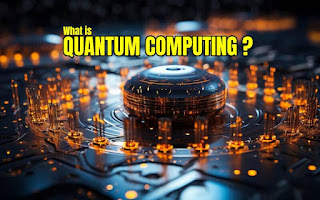Have you ever wondered about a computer so powerful it could solve problems no other computer could? Imagine a machine that could process information millions of times faster than today’s computers. Welcome to the world of quantum computing.
What exactly is quantum computing?
So, what exactly is quantum computing? Simply put, it’s a field of computer science that harnesses the mind-bending principles of quantum theory. Quantum theory explains how energy and matter behave at the tiniest levels, like atoms and particles. In quantum computing, we use these tiny particles—like electrons or photons—to perform calculations.
At its core, Quantum Computing is a new paradigm of computing that leverages the principles of quantum mechanics to perform calculations and solve problems in ways that are fundamentally different from classical computing. Unlike classical computers, which use bits to represent information as either 0 or 1, Quantum Computing employs quantum bits or qubits, which can exist in a superposition of both 0 and 1 simultaneously. This allows Quantum Computers to perform vast numbers of calculations in parallel, enabling them to tackle complex problems with exponential speed and efficiency.
But what sets Quantum Computing apart from classical computing, and why is it generating so much excitement and anticipation?
Bits Vs Qubits
Now, let’s dive a bit deeper. Imagine a classical computer—those we use every day. They work with bits, which are like tiny switches that can be either on or off, representing 1 or 0. But in quantum computing, we have something called qubits, short for quantum bits. These qubits, unlike classical bits, can be in multiple states simultaneously thanks to a concept called superposition.
Can you imagine a computer being both on and off at the same time?
That’s what happens with Qubits—they can exist in many states simultaneously, giving Quantum computers an incredible ability to process information in parallel. Another crucial concept in quantum computing is entanglement. Imagine two particles becoming so interconnected that changing one instantly affects the other, no matter how far apart they are. This phenomenon allows quantum computers to solve complex problems much faster than classical computers.
Let’s talk about Decoherence
Now, let’s talk about Decoherence. It’s like the kryptonite for quantum computing. Decoherence happens when the delicate quantum state of a qubit collapses due to interference from the environment, like radiation. Engineers are working hard to tackle this challenge by designing special structures to shield qubits from external factors.
So, why should you care about quantum computing? Well, imagine the possibilities: solving complex problems in minutes that would take classical computers millions of years, revolutionizing fields like medicine, finance, and cryptography.
As you ponder over the marvels of quantum computing, consider this: What would you do with a computer that could process information at unimaginable speeds? Share your thoughts, and let’s explore the future together. Who knows, maybe one day you’ll be part of the quantum revolution!


